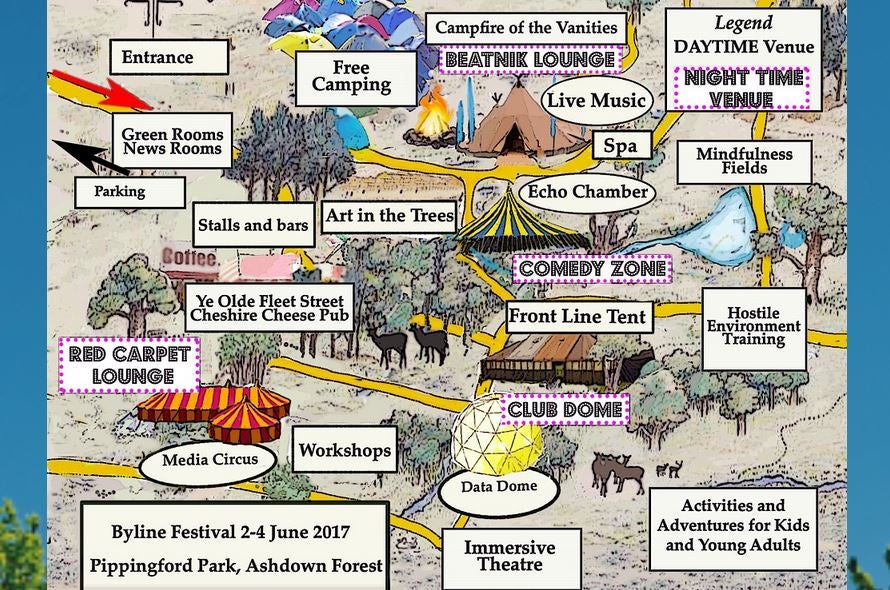
Phone-hacking was the last hurrah for wild west journalism in the UK, according to former tabloid features writer Dan Evans, speaking this weekend at the Byline Festival for independent journalism.
Former News of the World and Mirror journalist Evans entertained and shocked festival-goers with lurid tales of tabloid antics at the three-day event at Pippingford Park in East Sussex.
He was joined on stage in the main ‘Media Circus’ tent by former tabloid investigative reporter Graham Johnson who blew the whistle on phone-hacking at the Sunday Mirror after admitting his own involvement. Both received suspended sentences and community service orders.
Before the hacking scandal, tabloid culture was intensely competitive and largely involved “managing the bollockings in your life”, according to Evans. “You’d pretty much do anything to get through the week”, said Johnson.
The pressures on journalists and the industry were two recurring themes at the festival which sought to promote discussion on independent journalism.
There was also discussion about how mainstream organisations can take more responsibility for the safety of freelances in conflict zones, a call for ‘blind’ job applications to increase diversity in the media and criticism of the “herd mentality” in mainstream reporting.
The festival was a meeting place for an estimated 2,500 independent journalists, a smattering of mainstream journalists, activists, lawyers, academics, aspiring young journalists and members of the public interested in the future of journalism.
Journalism is like the NHS
In a keynote address Martin Bell, OBE, warned that good journalism was like the NHS: you didn’t miss it until it was gone.
He added: “Too much time is spent sitting on chairs in front of screens intercepting other people’s material and using it as your own. There is no substitute for eye witness reporting.”
Whistleblowers’ prize awarded
The most popular bar was inside The Frontline Club’s original US army MASH tent from the Korean War.
There were no free cocktails, but the tent did host the inaugural Gavin MacFadyen Award in honour of the former head of the Centre for Investigative Journalism who died last year.
The prize is awarded by whistleblower charities, The Whistler and Compassion in Care, to journalists or publishers who have helped whistleblowers expose the truth.
The inaugural award went to Private Eye, not only in recognition of decades of great journalism, but for its ability to get to the heart of a story, exposing organisational culture and the failure of authorities and the justice system.
‘Reporting Muslims’
Journalists and the Muslim community were urged to engage more with each other an attempt to change the narrative about Muslims in the media.
Speaking before the latest attacks in London, Dr Shazar Amin told the Byline festival: “There is generally a set play with a set narrative and a set script. Journalists need to be more pluralist in their outlook and seek out different voices.”
Amin is a retired NHS Consultant and chief executive of Mend, a charity which seeks to combat islamaphobia.
He said: “The Muslim community has been conditioned by the constant bad news to assume that every journalist has bad intentions, but there are journalists – often independent journalists – who are out there looking for stories.”
He talked about visiting Didsbury mosque last week in the wake of the Manchester attacks. The mosque, he said, had been used by the bomber and portrayed in the media in a way which suggested it was a hotbed of extremism.
“But flowers, chocolates and letters had been left there by neighbours in support of the mosque,” he said.
“I tried to get the mosque to invite the local press to visit the mosque, but they didn’t want to because they thought they might print something even more negative.
“Sometimes we retreat into our shells and think that all journalists want to write bad things about us because all we hear, day in and day out, is bad news.”
Why New York Times wrong to ditch readers’ editor
Media critic and author Jay Rosen spoke out against the closing down of the public editor role at the New York Times. He said that, whilst every editor hated the ombudsman job, it was shortsighted of the paper to close down the post.
“More and more of the economy of the New York Times depends on its core supporters becoming subscribers, and more and more of the cultural influence of the paper depends on its readers trusting it,” he said. “Trust is what is going to save and maintain the influence of the paper.”
The New York Times said it was eliminating the job because social media now played the watchdog role.
Rosen said: “What happens now is that controversies erupt, stories get mishandled, mistakes get made and the public is much more able to see that with social media. The public editor was able to relieve some of the pressure and make these mistakes less damaging.
“It is something they will live to regret. Not only should they not eliminate the public editor, they should have two.”
The second Byline Festival has already been announced and will take place over four days from August 24 to 27, 2018.
Email pged@pressgazette.co.uk to point out mistakes, provide story tips or send in a letter for publication on our "Letters Page" blog
